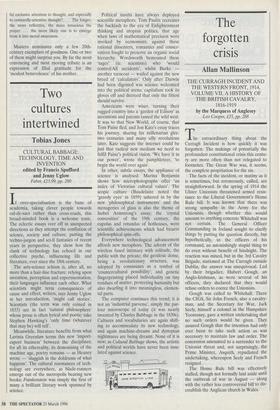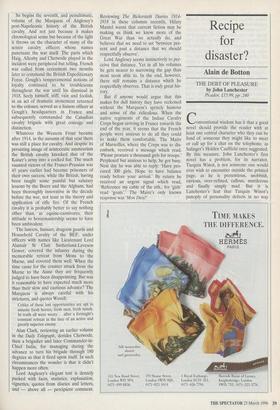The forgotten crisis
Allan Mallinson
THE CURRAGH INCIDENT AND THE WESTERN FRONT, 1914, VOLUME VII, A HISTORY OF THE BRITISH CAVALRY, 1816-1919 by the Marquess of Anglesey Leo Cooper, £35, pp. 288 The extraordinary thing about the Curragh Incident is how quickly it was forgotten. The makings of potentially the profoundest constitutional crisis this centu- ry are more often than not relegated to footnotes. The Great War was, it seems, the complete propitiation for the sin.
The facts of the incident, or mutiny as it is sometimes, but erroneously, called, are straightforward. In the spring of 1914 the Ulster Unionists threatened armed resis- tance to the Liberal Government's Home Rule bill. It was known that there was strong sympathy in the Army for the Unionists, though whether this would amount to anything concrete Whitehall was not certain. The General Officer Commanding in Ireland sought to clarify things by putting the question directly, but hypothetically, to the officers of his command, an astonishingly stupid thing to do even without benefit of hindsight. The reaction was mixed, but in the 3rd Cavalry Brigade, stationed at The Curragh outside Dublin, the answer was unequivocal. Led by their brigadier, Hubert Gough, an Anglo-Irishman, as were several of his officers, they declared that they would refuse orders to coerce the Unionists.
Gough was called to Whitehall. There the CIGS, Sir John French, also a cavalry- man, and the Secretary for War, Jack Seely, himself a colonel in the Hampshire Yeomanry, gave a written undertaking that no such orders would be given. They assured Gough that the intention had only ever been to take such action as was necessary to maintain law and order. The concession amounted to a surrender to the Unionist threat and, not surprisingly, the Prime Minister, Asquith, repudiated the undertaking, whereupon Seely and French resigned. The Home Rule bill was effectively stalled, though not formally laid aside until the outbreak of war in August — along with the rather less controversial bill to dis- establish the Anglican church in Wales. So begins the seventh, and penultimate, volume of the Marquess of Anglesey's post-Napoleonic history of the British cavalry. And not just because it makes chronological sense but because of the light it throws on the character of many of the senior cavalry officers whose names punctuate the war itself. The parts which Haig, Allenby and Chetwode played in the incident were peripheral but telling. French was called from retirement two months later to command the British Expeditionary Force. Gough's temperamental notions of loyalty continued to be troublesome throughout the war until his dismissal in 1918. Seely himself, stiff, vain and foolish, in an act of dramatic atonement returned to the colours, served as a liaison officer at Gough's headquarters in France and subsequently commanded the Canadian cavalry brigade with great courage and distinction.
Whatever the Western Front became after 1914, in the autumn of that year there was still a place for cavalry. And despite its persisting image of aristocratic amateurism the British cavalry knocked that of the Kaiser's army into a cocked hat. The much vaunted victors of the Franco-Prussian war 45 years earlier had become prisoners of their own success, while the British, having been taught some painful but salutary lessons by the Boers and the Afghans, had been thoroughly innovative in the decade before the war, not least in the theory and application of rifle fire. Of the French cavalry it is probably better to say nothing other than, as equine-carnivores, their attitude to horsemastership seems to have been ambivalent.
The lancers, hussars, dragoon guards and Household Cavalry of the BEF, under officers with names like Lieutenant Lord Alastair St Clair Sutherland-Leveson Gower, covered the infantry during the memorable retreat from Mons to the Marne, and covered them well. When the time came for the counter attack from the Marne to the Aisne they are frequently judged to have been disappointing. But was it reasonable to have expected much more than their slow and cautious advance? The Marquess is always careful with his strictures, and quotes Wavell:
Critics of these lost opportunities are apt to assume fresh horses, fresh men, fresh minds. In truth all were weary. .. after a fortnight's constant retreat in the face of an active and greatly superior enemy.
Alan Clark, reviewing an earlier volume in the Daily Telegraph, derides Chetwode, then a brigadier and later Commander-in- Chief India, for managing during the advance to turn his brigade through 180 degrees so that it fired upon itself. In such circumstances the wonder is that it didn't happen more often.
Lord Anglesey's elegant text is densely packed with facts, statistics, explanation, vignettes, quotes from diaries and letters, and — above all — percipient comment. Reviewing The Bickersteth Diaries 1914- 1918 in these columns recently, Hilary Mantel warns that current fiction may be making us think we know more of the Great War than we actually do, and believes that we need to set 'between pre- sent and past a distance that we should respectfully observe'.
Lord Anglesey seems instinctively to per- ceive that distance. Yet in all his volumes he gets nearer to narrowing the gap than most seem able to. In the end, however, there still remains a distance which he respectfully observes. That is truly great his- tory.
But if anyone would argue that this makes for dull history they have reckoned without the Marquess's spritely humour and sense of the ridiculous. When the native regiments of the Indian Cavalry Corps began arriving in France towards the end of the year, it seems that the French people were anxious to do all they could to make them comfortable. The Maire of Marseilles, where the Corps was to dis- embark, received a message which read, `Please procure a thousand girls for troops.' Perplexed but anxious to help, he got busy. Next day he was able to reply: 'Have pro- cured 300 girls. Hope to have balance ready before your arrival.' By return he received an urgent signal which read, `Reference my cable of the nth., for 'girls' read 'goats': The Maire's only known response was 'Mon Dieu!'



































































 Previous page
Previous page